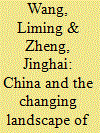|
|
|
Sort Order |
|
|
|
Items / Page
|
|
|
|
|
|
|
| Srl | Item |
| 1 |
ID:
100255


|
|
|
|
|
| Publication |
2010.
|
| Summary/Abstract |
The rapid development of emerging markets is changing the landscape of the world economy and may have profound implications for international relations. China is often regarded as the most influential emerging market economy because, during the last three decades, it has become increasingly integrated into the world economic system and its success and failure now affect the well-being of other nations in the world. As the financial crisis in the US and EU intensifies, the economic prosperity of the world depends to a large extent on the sustained development of the Chinese economy and other emerging markets, and vice versa.
|
|
|
|
|
|
|
|
|
|
|
|
|
|
|
|
| 2 |
ID:
116495


|
|
|
|
|
| Publication |
2012.
|
| Summary/Abstract |
Drawing on the fast growing literature concerning Chinese development and transition, we sketch a general framework for understanding the 'China Miracle' that the 'conventional wisdom' and 'Washington Consensus' cannot fully explain. Reflecting upon the recent financial crisis and the subsequent worldwide economic downturn, an attempt is made to present a paradigm, inspired by Chinese practice over the past decades, from a historical perspective. We conjecture that a desirable China model may maintain the characteristics of a good economy as proposed in Phelps (2006) with full employment and rights to personal development. With regard to the functioning of freely competitive markets and macroeconomic policy, not only should a China model be able to mimic the rule of law and accountability of liberal western democracies, but it might also possess a mainstream ideology that is deeply rooted in Chinese culture with modern social sciences as theoretical foundations. To divest China of undesirable properties from the existing system, it is necessary to establish a principle-agent relationship that can provide stable governance structure for day-to-day efficient management of the economy and society, and protect the fundamental interests of its citizens when external challenges threaten to weaken social cohesion and political stability.
|
|
|
|
|
|
|
|
|
|
|
|
|
|
|
|
| 3 |
ID:
100261


|
|
|
|
|
| Publication |
2010.
|
| Summary/Abstract |
This paper tests the volatility spillovers between the Shanghai market and the main developed stock markets abroad, namely New York, Tokyo, London, and Frankfurt, as well as between the Shanghai market and the emerging stock markets, namely Hong Kong, and Korea. The tests cover the period of 11 July 2005-12 July 2007 and 1 August 2007-10 July 2009, since the financial crisis started from July 2007. To account for asymmetries in the volatility transmission mechanism, we have used the GARCH and EGARCH model. The main findings are as follows. First, the degree of the Leverage Effect of the Shanghai market changes in the opposite direction from most of the other sample markets after the financial crisis began in July 2007. This change implies that investors in the Shanghai markets began to pay close attention to bad news. Secondly, reciprocal spillovers exist for some market pairs before the crisis, as the Shanghai A-share market has unidirectional influence on the emerging markets. After the onset of the financial crisis, the stock markets in developed countries have bidirectional influences on each other. The financial crisis brings the developed markets closer together than before, but they do not receive volatility spillover from the Shanghai A-share market. The financial crisis also influences the Asian emerging markets so as to decrease the volatility transmission that comes from the Shanghai A-share market. The Chinese mainland market is still not a vital security market in the world, although it has become the third largest one. Thirdly, the risk-precautionary role of the Shanghai B-share market is not as significant as expected.
|
|
|
|
|
|
|
|
|
|
|
|
|
|
|
|
| 4 |
ID:
116499


|
|
|
|
|
| Publication |
2012.
|
| Summary/Abstract |
This paper attempts to examine the impact of government intervention on executive compensation contracts by employing the data of listed companies in the Chinese equity market. The results show that redundancy burden caused by government intervention significantly reduces the compensation-performance sensitivity of executives in state-owned enterprises (SOEs), increases the level of compensation stickiness and leads to more executive perks. However, there is no evidence to support this conclusion in non-SOEs. Our results indicate that government has great responsibility for redundancy in SOEs and has a significant impact on the design of executive compensation contracts, but has limited impact on that of non-SOEs. Therefore, the impact of redundancy burden on executive compensation contracts is different between SOEs and non-SOEs. Our findings have important implications for the relationship between property rights and corporate performance, the formation mechanism of redundancy, and the impact of redundancy burden on executive compensation contracts.
|
|
|
|
|
|
|
|
|
|
|
|
|
|
|
|
|
|
|
|
|